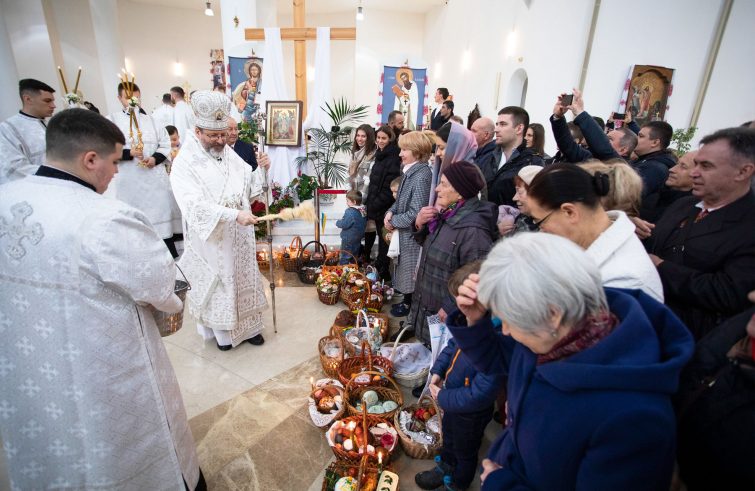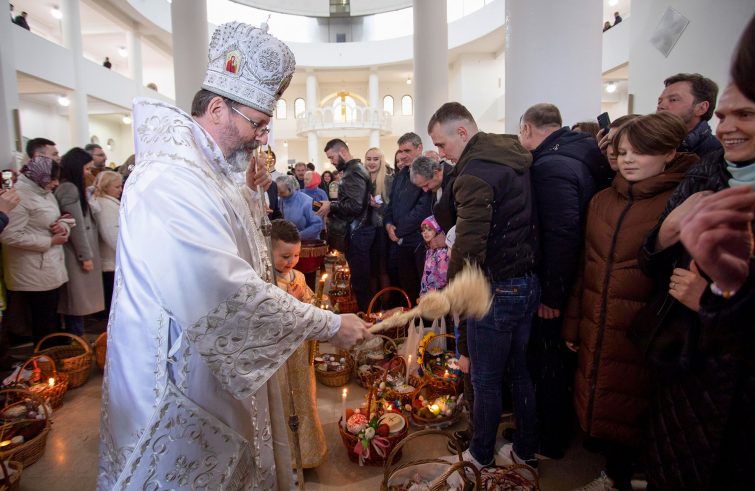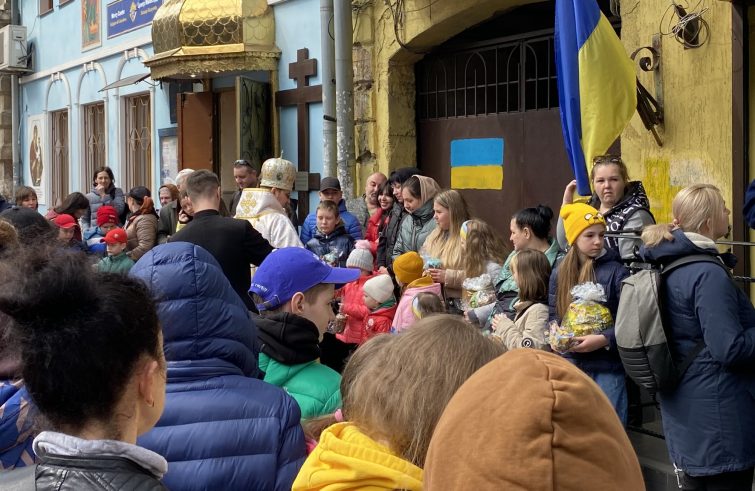
 Yet another Easter was celebrated amidst relentless shelling and bloodshed, just like last year. More than 13,000 churches throughout Ukraine celebrated services for the Orthodox Easter – which, according to the Julian calendar, falls one week after the Catholic Easter. Figures released by the National Police communications chief Oksana Blyshchyk show that services were held in 13 thousand churches across Ukraine. Easter was celebrated in 163 places of worship in the city of Kyiv alone. This is clearly a very high number, as also small religious buildings are counted in the overall figures. High numbers of law enforcement officers were deployed to ensure the highest level of security, with more than 20,000 officers deployed nationwide, while excavations are still underway in Sloviansk, hit by Russian missile strikes on April 14. Despite the precautions, however, Russian S-300 missiles destroyed St Michael the Archangel church in the village of Komyshuvakha in the Zaporizhzhia region in a bombing attack on Easter night. “The good sense of our priests ensured that the Easter service and food blessings were not held at that hour – since normally the church is very crowded,” said the congregation’s leader, Yurii Karapetian, clarifying that they had been advised not to hold the traditional Easter night services “owing to the risk of missile attacks.” Ukrainian President Volodymyr Zelensky’s greetings exalt a victorious outcome: “Today we celebrate Easter with unwavering faith in our victory. We have already gone a long way. But we might be still facing the greatest challenge. We will overcome it. Together we will move forward towards our dawn, when the sun will rise all over our country.”
Yet another Easter was celebrated amidst relentless shelling and bloodshed, just like last year. More than 13,000 churches throughout Ukraine celebrated services for the Orthodox Easter – which, according to the Julian calendar, falls one week after the Catholic Easter. Figures released by the National Police communications chief Oksana Blyshchyk show that services were held in 13 thousand churches across Ukraine. Easter was celebrated in 163 places of worship in the city of Kyiv alone. This is clearly a very high number, as also small religious buildings are counted in the overall figures. High numbers of law enforcement officers were deployed to ensure the highest level of security, with more than 20,000 officers deployed nationwide, while excavations are still underway in Sloviansk, hit by Russian missile strikes on April 14. Despite the precautions, however, Russian S-300 missiles destroyed St Michael the Archangel church in the village of Komyshuvakha in the Zaporizhzhia region in a bombing attack on Easter night. “The good sense of our priests ensured that the Easter service and food blessings were not held at that hour – since normally the church is very crowded,” said the congregation’s leader, Yurii Karapetian, clarifying that they had been advised not to hold the traditional Easter night services “owing to the risk of missile attacks.” Ukrainian President Volodymyr Zelensky’s greetings exalt a victorious outcome: “Today we celebrate Easter with unwavering faith in our victory. We have already gone a long way. But we might be still facing the greatest challenge. We will overcome it. Together we will move forward towards our dawn, when the sun will rise all over our country.”
“All of us today – Ukrainians in particular – feel that the history of Christ’s death and resurrection is not just about Him: it concerns each and every one of us,” His Beatitude Sviatoslav Shevchuk, Head of the Ukrainian Greek Catholic Church, said in his Easter homily at the Patriarchal Cathedral of the Resurrection of Christ in Kyiv. From the very first moments of the first massive Russian attack of February 24, 2022, the cathedral – especially its basement – became a place of refuge and shelter for many people. “Our Lord extends his life-giving right hand, pierced on the cross, to each one of us today,” said His Beatitude Sviatoslav. “It caresses the wounds of our mournful and depleted Ukraine. Those same wounds we bear upon us today.” “It caresses the tears” and “even the death” we “see every day in our destroyed cities and villages”, saying: “I am your strength.”
“Today Ukraine is crucified, we are being killed,” Shevchuk emphatically declared. “But Ukraine is on the way towards victory, towards its resurrection.”
 The Easter homilies of the Greek Catholic bishops – from Kharkiv to Donetsk to Odessa – where the threat of Russian shelling is unfortunately relentless, resonate with the sorrows of the Ukrainian people, and yet also with their unwavering faith in their homeland’s victorious rebirth. “The war in Ukraine entered its second year. The Russian aggressor violated the peace of our land”, said Bishop Vasiliy Tuchapets, Exarch of the Ukrainian Greek Catholic Church in Kharkiv – 40 kilometres from the Russian border and constantly targeted by Russian artillery. The bishop praised the defenders of Ukraine, calling them “our heroes.” His thoughts also went to the “peaceful people and the innocent children”, that are dying because of the war.
The Easter homilies of the Greek Catholic bishops – from Kharkiv to Donetsk to Odessa – where the threat of Russian shelling is unfortunately relentless, resonate with the sorrows of the Ukrainian people, and yet also with their unwavering faith in their homeland’s victorious rebirth. “The war in Ukraine entered its second year. The Russian aggressor violated the peace of our land”, said Bishop Vasiliy Tuchapets, Exarch of the Ukrainian Greek Catholic Church in Kharkiv – 40 kilometres from the Russian border and constantly targeted by Russian artillery. The bishop praised the defenders of Ukraine, calling them “our heroes.” His thoughts also went to the “peaceful people and the innocent children”, that are dying because of the war.
“How much pain, how many people were maimed and wounded, how many are suffering in captivity, how many are missing!” the bishop said. “We all want this terrible war to end as soon as possible and resume a life of peace.”
The Exarch of the Greek Catholic Church in Odessa, Mykhaylo Bubniy, met with families that were forced to leave their homes, and gave the 140 children present an Easter basket. He assured them that the Church will continue supporting and helping them during this tragic time they are going through. “It would seem that military might and force are emerging triumphant on the battlefield,” Bishop Stepan Menyok and his auxiliary Maxim Ryabukha wrote from Donetsk. “But the struggle for truth, independence and love of homeland are stronger than weapons, because God is with us.” “Evil can never triumph over goodness. It is contrary to God’s Almightiness and His Love.”











